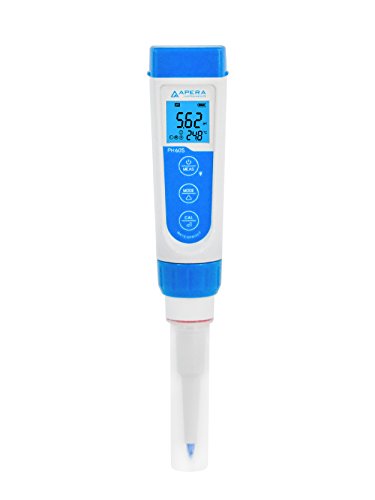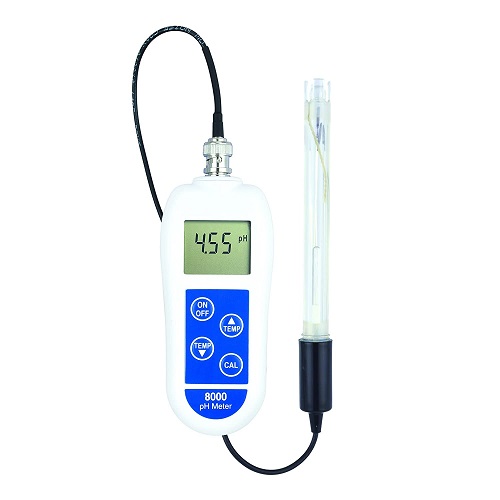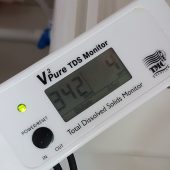pH testing is an essential part of many industries and fields including pool maintenance, water treatment, farming and food manufacturing.
There are different types of pH meters depending on what is being tested. Some meters are designed specifically for water testing while others can test solids and semi-solids.
In this in-depth buying guide, we review the best professional pH meters you can buy online. We picked the best meters in five testing categories: water, soil, hydroponics, lab and cosmetics.
What to Consider When Choosing a pH Meter
a) Type of pH Meter
The best type of pH meter depends on what you want to measure. Some pH meters are designed for testing liquids, others flat surfaces and others semi-solids.
The difference between these meters is usually the type of probe used.
The most common types of probes include spear tip probes for measuring biological samples like food, flat pH sensors for measuring solid surfaces like the skin and glass bulb probes for measuring liquid solutions.
b) Accuracy and Resolution
pH testing, whether in a lab or during fieldwork, typically requires a high degree of accuracy. So the accuracy of a pH meter is essential.
We recommend getting a pH meter with an accuracy rate of ±0.01 pH for high-precision testing and ±0.05 to ±0.1 for lower precision testing.
Another thing to check is resolution. This is the smallest change in pH the meter can record. A high resolution is better for precision testing as it allows you to detect even the smallest changes in pH.
The best pH meters have a resolution of 0.01 pH.
c) Temperature Sensor
Most pH meters include a temperature sensor to take temperature readings.
Even if you don’t need to measure temperature, or you have a separate temperature sensor, the pH meter may need to take temperature readings to provide accurate pH measurements.
This is called Automatic Temperature Compensation, which we discuss next.
d) Automatic Temperature Compensation
Automatic Temperature Compensation or ATC, is a feature in some pH meters that corrects for temperature differences between samples.
Temperature affects pH measurements. pH readings at a certain temperature can be different from readings taken at a higher or lower temperature.
ATC takes the temperature of the sample into account when calculating pH to ensure higher accuracy. ATC is especially important when you are comparing the pH of two or more samples that may have varying temperatures.
e) Display
Get a pH meter with a large backlit display. It will make taking measurements much easier. With a backlit display, you can measure pH in any kind of lighting.
If the meter has a built-in temperature sensor, check if the display can show both temperature and pH readings at the same time.
Some pH meters also display a bar graph, indicating the pH trend.
f) Auto Hold
When using a pH meter, you have to wait until you get stable readings. This can take as long as 20 seconds or more.
There’s a risk of taking the pH meter out too early before the readings are stable. Auto hold eliminates this risk.
Instead of you guessing when the readings are stable, the meter will automatically detect stable readings and hold the most accurate measurement.
Auto hold makes measuring pH more convenient and, most importantly, more accurate.
g) Other Considerations
- Internal memory: Some pH meters can store several previous readings. This is handy if you want to check a previous measurement or analyse trends.
- Calibration buffer: Check if the pH meter comes with a calibration buffer; some come with two for pH 4 and pH 7. A pH buffer allows you to recalibrate the meter to ensure it stays accurate.
- Water resistant or waterproof: This is especially important if you are testing liquids or working outdoors.
- Replaceable probes: Check if you can remove the probe on the pH meter and replace it with another compatible probe. This is handy if you usually measure different kinds of samples such as water, soil, foods and so on. You can buy just one pH meter and a set or probes to use with it. It’s more convenient and saves you money.
- Low battery indicator.
- Storage case and lanyard.
Best pH Meters Reviews
1. For Water: Apera Instruments PH60 Premium pH Meter

Apera Instruments PH60 is the best pH meter for water testing. It comes with a regular glass bulb sensor designed specifically for aqueous solutions.
The probe is replaceable. You can order other types of probes (specifically, a flat, spear or ORP probe) from Apera Instruments for measuring other types of samples.
The PH60 meter has an accuracy of ±0.01 pH and a measuring range of -2 to 16 pH.
The meter comes with two buffers – pH 4 and pH 7 – for auto-recalibration. The meter will recognize the buffer and calibrate itself automatically.
The PH60 pH meter has all the features you need for accurate measurements including automatic temperature compensation and auto-hold.
The display is large and backlit. It shows both temperature and pH readings.
One interesting feature about the PH60 display is how it changes colour to indicate the current mode or alert you.
Blue is the default mode. It indicates that the meter is currently taking measurements. Green indicates calibration. When you see red, it is a visual alert for measurements above or below a pre-set range. This allows you to quickly spot too-high or too-low pH readings.
For protection and durability, the Apera Instruments PH60 pH meter is waterproof and dustproof up to IP67.
Accessories provided with the PH meter include AAA batteries, carrying case and lanyard.
2. For Soil: Extech Instruments PH100 Waterproof pH Meter

The Extech Instruments PH100 is the best pH meter for soil. It has a flat pH electrode, which is perfect for measuring solid samples like soil.
You can also use the PH100 to measure small amounts of liquids as well as semi-solids.
The meter has automatic temperature compensation, so you don’t have to worry about temperature differences between samples.
The measuring accuracy is ±0.01 pH and the resolution is 0.01pH, making the PH100 a good choice for high-precision testing.
The PH100 has a small internal memory – enough to store up to 15 readings. You can recall these readings at any time.
There’s a hold function but it’s manual. That means it’s up to you to decide when the readings are stable then press the hold button to freeze the value on the display.
The display is large and the numbers for pH and temperature are easy to see. The screen also shows a bar graph, a low battery indicator and a CAL reminder that alerts you when it is time to recalibrate the meter.
The PH100 doesn’t come with buffer solutions for recalibrating the meter. You have to get those yourself.
You can do a 1, 2 or 3-point recalibration depending on the average range of your pH meaurements.
The Extech Instruments PH100 is waterproof and designed for use in rough environments.
3. For Hydroponics: Essentials pH Meter

If you need to check the pH of nutrient solutions to ensure proper plant growth, we recommend the Essentials pH meter.
It is designed specifically for gardening and hydroponics, though you can also use it to maintain an aquarium or any aqueous environment.
The Essentials pH meter has an integrated temperature sensor for automatic temperature compensation. You can compare solutions with different temperatures accurately.
The display is a bit small but still easy to use. It is backlit so you can take measurements in dark areas such as under foliage.
A hold button lets you freeze the latest value on the screen, though it’s up to you to decide when the readings are stable. Generally, it takes 20 seconds for readings to stabilise.
The Essentials pH meter is water resistant. If you accidentally drop it in water, it will float, which protects the internal electronics.
It is also shock resistant in case of an accidental drop.
To maintain testing accuracy, the Essentials pH meter comes with a pH 7 buffer. You can also use a pH 4 or pH 10 buffer, depending on the average pH of your hydroponic solutions.
The Essential pH meter lasts between 1 and 3 years depending on how often you take readings.
4. For Lab: ETI 8000 pH Meter
Unlike the other pen-style pH meters, the ETI 8000 has a remote pH sensor attached to the main body of the meter with a cable.
You hold the main unit in one hand and the sensor in the other. The advantage of a remote sensor is that you can easily see the readings as you take measurements. You don’t have to bend down or turn the meter around to see the display.
The ease and convenience of testing makes the ETI 8000 perfect for laboratory settings.
By the way, the probe is detachable. If you want to use a different type of probe, just remove the current one and insert the new one.
The ETI 8000 has an accuracy of ±0.05 pH and a resolution of 0.01 pH.
Like most other professional pH meters, it comes with automatic temperature compensation. You can also compensate for temperature differences manually.
The LCD display is large and easy to use.
Calibrating the ETI 8000 pH meter is easy and fast. Just dip it in the right buffer and press the calibration button.
Note that the meter doesn’t come with a buffer – you have to buy it separately.
5. For Cosmetics: Apera Instruments PH20 pH Meter

Testing the pH of cosmetics is not just important for manufacturers, but consumers and dermatologists as well.
Choosing cosmetics with the right pH ensures proper pH balance on your skin, which maintains good skin health and appearance.
The Apera Instruments PH20 is the best pH meter for cosmetics. The glass bulb probe can measure aqueous solutions, such as that of cream diluted in water (creams, shampoos and other cosmetics are first diluted in distilled water before measuring pH).
The PH20 meter has an accuracy of ±0.1 pH and ±0.5°C for temperature measurements.
To improve precision, the PH20 meter has an auto-hold feature. It will automatically recognize when the readings are stable and hold the right one for your viewing.
Additionally, it allows 1, 2 or 3-point re-calibration.
The pen comes with two buffer liquids – pH 4 and pH 7. If you need 3-point calibration, buy the pH 10 buffer separately (useful if some of your readings are higher than pH 7).
The display is clear and easy to read. It is backlit for easy measurements in low light conditions. It shows both pH and temperature readings as well as a low battery indicator and a stable reading indicator.
Unlike the PH100 however, it lacks an alert for out of range readings.
The PH20 has a protection rating of IP67, meaning it is water and dust proof.
Accessories provided with the meter include AAA batteries, a lanyard, buffer solutions and a carrying case.
6. For Food: Apera Instruments PH60S Premium pH Meter

A spear pH probe such as the one on the Apera Instruments PH60S pH meter is the best choice for measuring pH in food substances.
The spear easily penetrates solid food and can be used to test semi-solid foods as well.
Some of the foods you can test using the PH60S include cheese, meats and yogurt.
The LCD display shows pH readings in large numbers. It is backlit so you can take measurements in low light conditions.
The display can light up in three different colors to indicate the current mode. When it flashes red, it means there’s a reading that is higher or lower than a pre-set range. This alerts you to extreme measurements that need immediate attention.
The PH60S has auto-calibration. You can opt for between 1 and 3-point calibration – 4, 7 and 10.01.
Buffers for pH 4 and 7 calibrations are included along with the pH meter.
Other accessories include a lanyard, AAA batteries and a carrying case.



